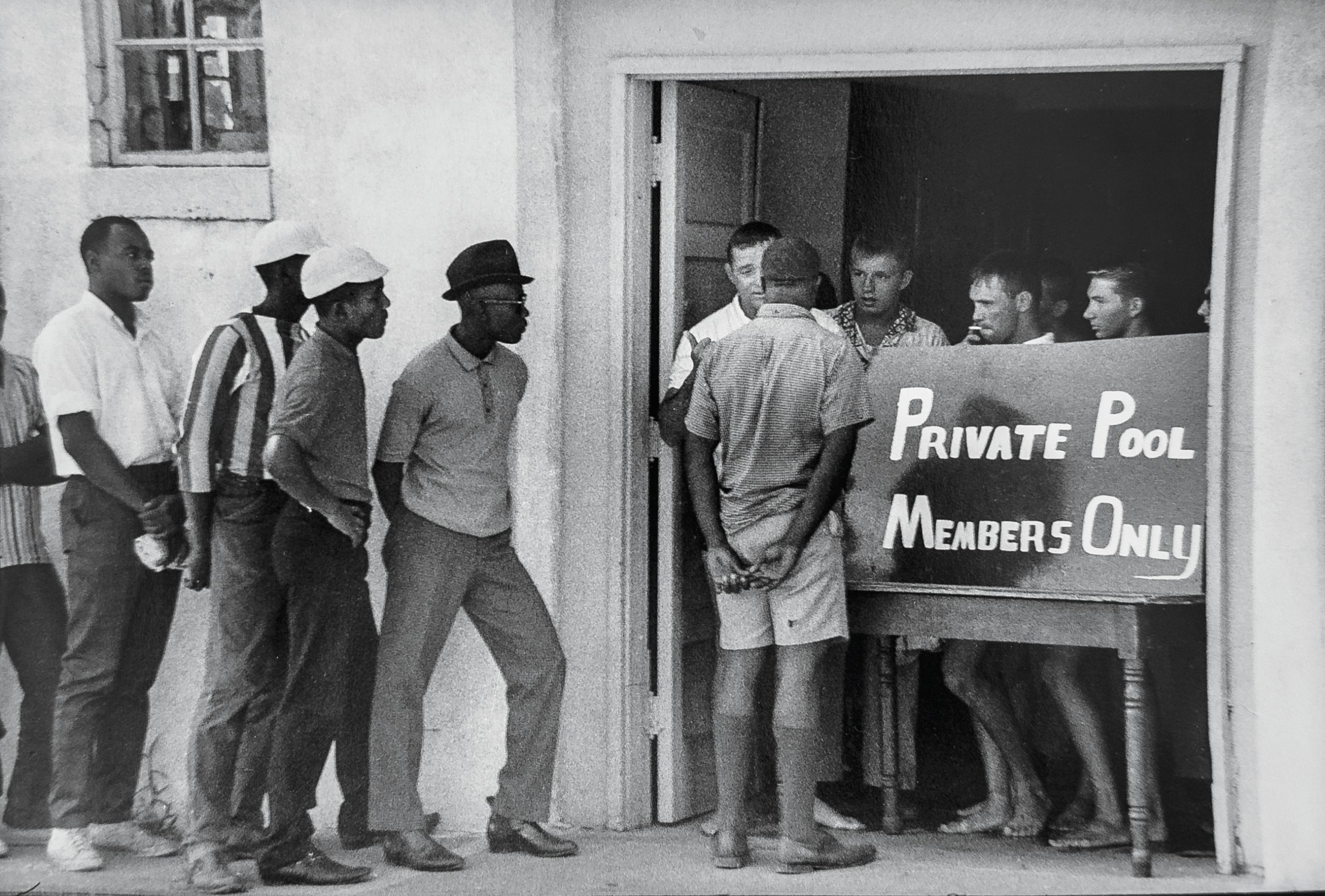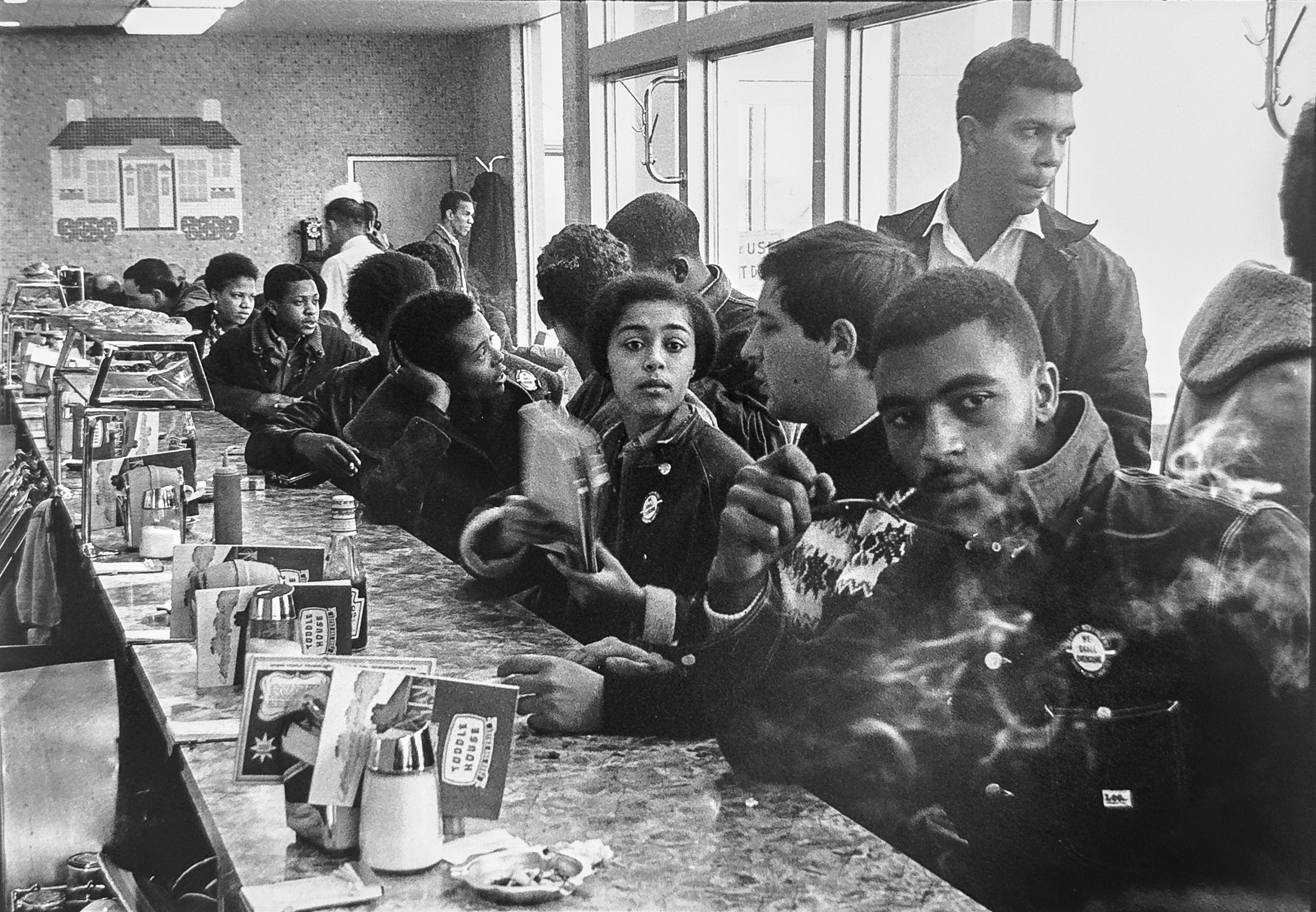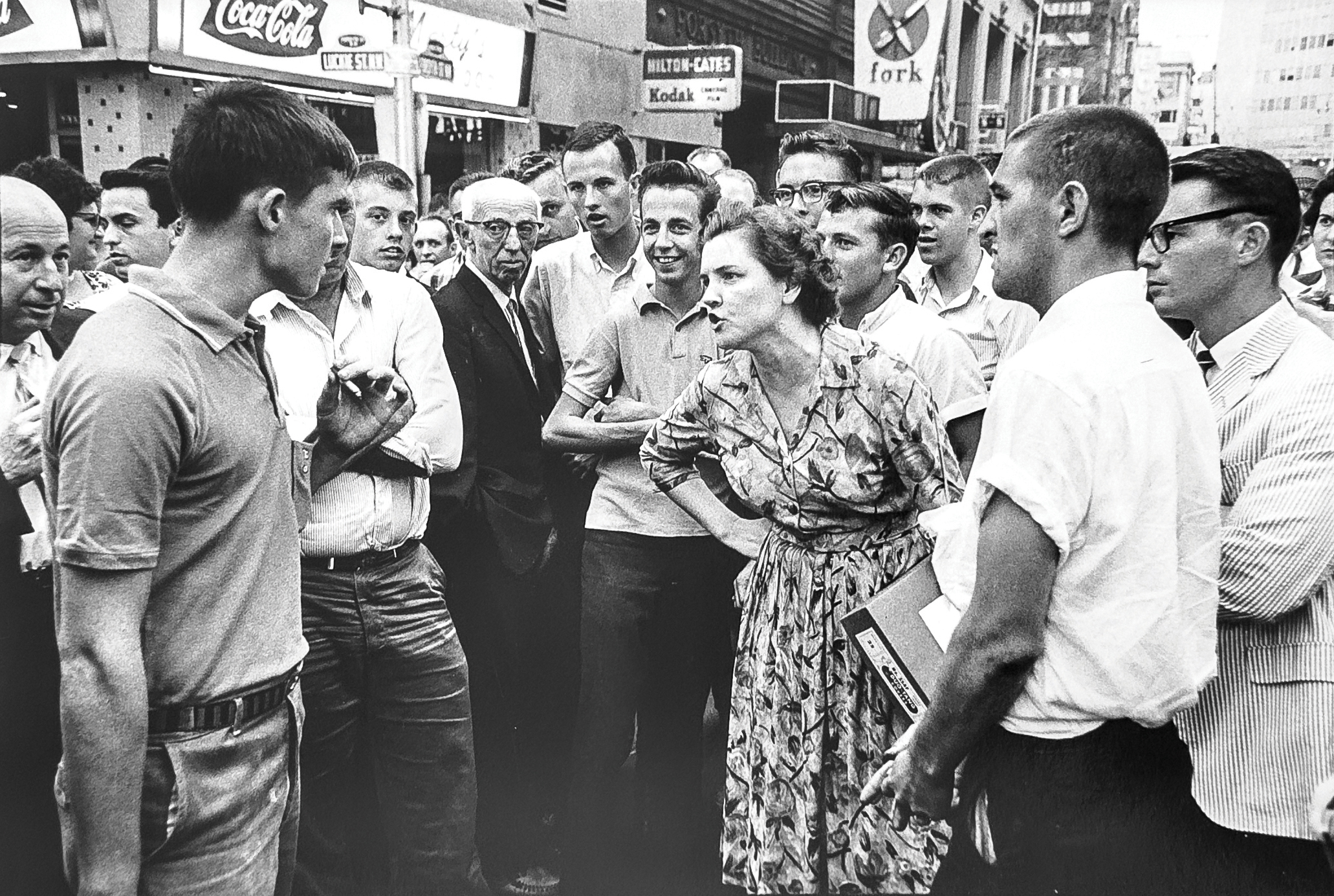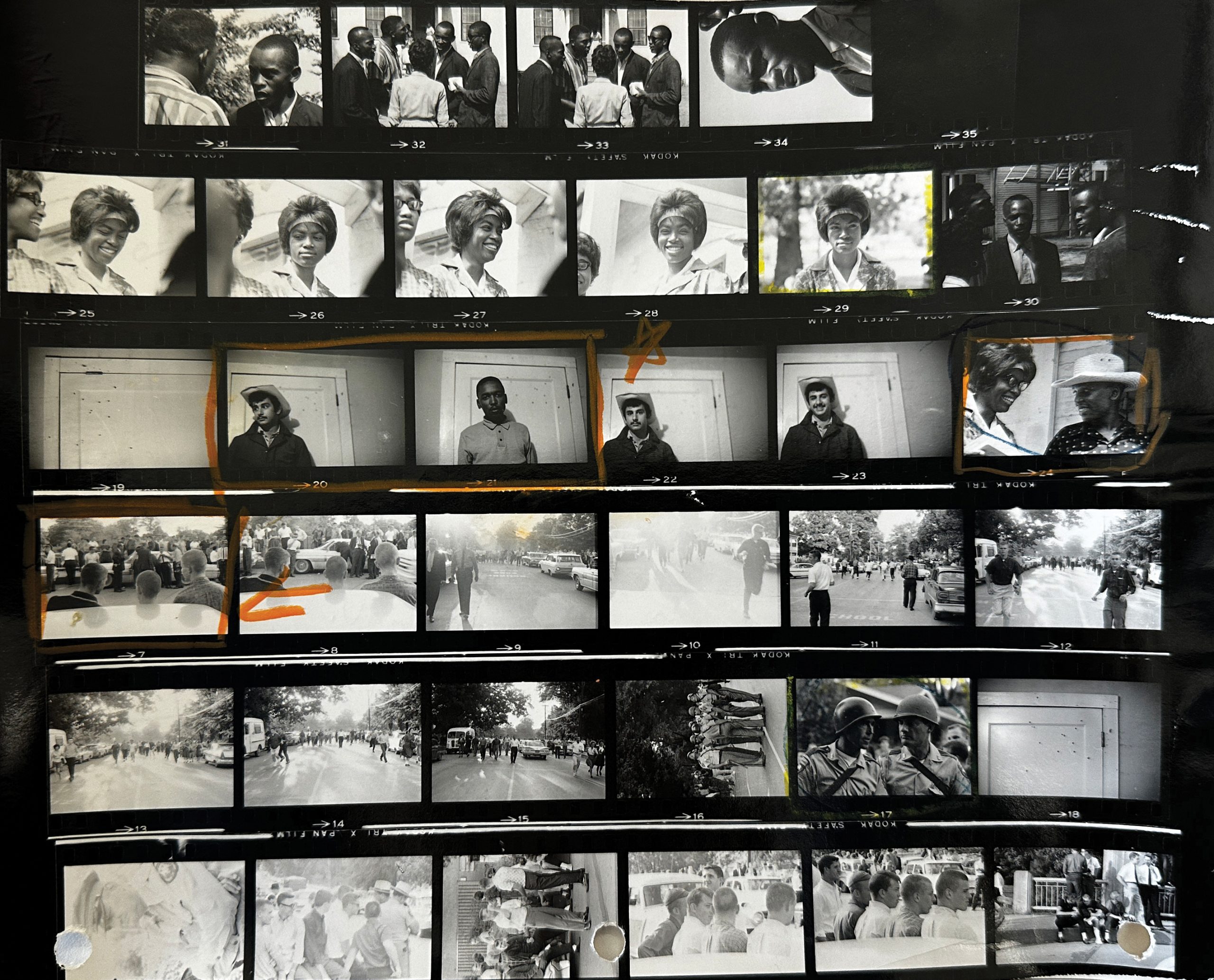
The David M. Rubenstein Rare Book & Manuscript Library at Duke University has acquired the archive of photographer and filmmaker Danny Lyon, who shot some of the most powerful and enduring images of the Civil Rights movement in the 1960s.
The collection encompasses Lyon’s work with the Student Nonviolent Coordinating Committee (SNCC) and his continued documentation of the movement up to the present day through writing, photography, and film. It was acquired as a gift of the Kohler Foundation, a family foundation based in Kohler, Wisconsin, that supports the arts, education, and art preservation. The family has a long-standing connection to the university with alumni Laura Kohler T’84, David Kohler T’88, and Rachel Kohler Proudman T’23.
Born in Brooklyn in 1942, Lyon began taking pictures at the age of seventeen and taught himself photography. After earning a degree in history from the University of Chicago, he met SNCC executive secretary James Forman, who convinced the twenty-year-old Lyon to join the youth-led, voting rights organization as staff photographer.

During his time with SNCC, Lyon, one of several white Northerners inspired to join the movement, captured the dramatic struggle for racial equality across the South, and his photographs became the visual backbone of SNCC’s campaigns. They depict the courage and commitment of young people in the movement, as well as the violence and hatred of segregationists who opposed them. Many of Lyon’s now-iconic images were instrumental in garnering public sympathy for the Civil Rights movement and inspiring others to get involved. This is the first time they have been assembled as a collection and made publicly available for research and consultation.
The collection includes nearly 8,500 individual images, most of which have never been published or seen outside of Lyon’s studio. They include over 300 gelatin silver prints made between 1962 and the early 1970s, and more than 200 contact sheets containing a complete record of Lyon’s civil rights photography from 1962 to 1964, with the photographer’s notes and markings throughout. The collection also contains correspondence, SNCC publications and posters, and materials related to the publication of two books of Lyon’s civil rights photography, The Movement: Documentary of a Struggle for Equality (1964, with text by Lorraine Hansberry) and Memories of the Southern Civil Rights Movement (1992).
Also included are all elements used in Lyon’s 2020 documentary film SNCC, along with hundreds of hours of unused digital audio and video footage featuring SNCC veterans, particularly U.S. Representative and civil rights icon John Lewis, recorded near the end of Lewis’s life. As a SNCC staff member, Lyon developed close ties with Lewis, Julian Bond, James Forman, and other well-known civil rights activists of the time, who figure prominently in his photographs now at Duke.

Taken together, the materials in Lyon’s archive offer a previously unseen, eyewitness view of the social and political upheaval that embroiled the South in the 1960s. They complement other noteworthy collections of civil rights photography held by the Rubenstein Library’s Archive of Documentary Arts— including the work of photojournalists James Karales and James “Spider” Martin—and numerous collections documenting civil rights and social justice work held by the John Hope Franklin Research Center for African and African American History and Culture, also part of the Rubenstein Library.
“We are honored to be the institutional home of Danny Lyon’s historic civil rights photography, and we are grateful to the Kohler Foundation for bringing his archive to Duke, where it will be open to the public,” said Joseph A. Salem, Jr., Rita DiGiallonardo Holloway University Librarian and Vice Provost for Library Affairs. “His thousands of images documenting SNCC’s activism across the South represent an invaluable visual record. They provide additional, never-before-seen context to a critical chapter in our nation’s history, and they have the potential to open up profound new understanding of grassroots organizing and the civil rights era.”

This acquisition also contributes to the Movement History Initiative, a collaboration between the SNCC Legacy Project and Duke University that that brings together activists, archivists, and academics. This partnership lifts up the grassroots organizing tradition and passes on successful organizing strategies and tactics to the next generation. Archiving the records of activists and artists of the civil rights era and engaging today’s activists in the preservation of their own history are critical to documenting movement history from the bottom up and the inside out.
Over the last ten years, the Movement History Initiative has established intergenerational relationships among activists; built an archive of movement knowledge in the Franklin Research Center, including new oral histories and multimedia works; developed and sustained innovative digital platforms that serve as encyclopedic sources and educational tools for movement history; changed the way civil rights history is taught through curriculum development and teacher institutes; hosted national conferences on voting rights and grassroots organizing; and mentored Black archivists. The SNCC Digital Gateway and Civil Rights Movement Archive websites, both supported by the Duke University Libraries, attract hundreds of thousands of visitors annually. This work has been supported through grants from the Mellon Foundation, Ford Foundation, National Endowment for the Humanities, and the generous gifts of individuals.
“Danny Lyon’s documentary work reflects his keen commitment to be much more than a passing observer,” said Tom Rankin, Director of the MFA in Experimental and Documentary Arts Program at Duke and Professor of the Practice of Art, Art History & Visual Studies. “With a historian’s mind and a humanist’s heart, Lyon’s documentary photography and writing have forever brought intimate clarity to the central issues of our day. His civil rights work and archive—from his photographs, films, notes, and ephemera—bring viewers close to the ordinary moments as well as the crucible events of the civil rights movement. Having Lyon’s humanity, commitment, and clarity of vision with Duke’s archive provides a profound and lasting resource to scholars, students, artists, activists, and viewers of all kinds.”

“Kohler Foundation is deeply honored to be a part of preserving this remarkable collection,” said Laura Roenitz, Executive Director of Kohler Foundation, Inc. “Danny Lyon’s work is not just a snapshot of history; it’s a testament to the enduring spirit of those who challenged injustice and fought for a more equitable society. This donation aligns perfectly with our mission of preserving the art that connects communities and we know the Rubenstein Library at Duke University, known for its commitment to preserving and sharing historical collections, is an ideal home for the Danny Lyon Archive. This donation provides students, scholars, and the public with access to this invaluable resource, ensuring that it continues to inspire and educate for generations to come.”
Since his early work with SNCC, Lyon has gone on to become one of the most influential and noteworthy documentarians of our time. He has received Guggenheim Fellowships in photography and filmmaking, numerous grants from the National Endowment for the Arts, and his work has been featured in major museums. His many books showcase Lyon’s immersive approach to documentary photography, whether training his camera on outlaw biker gangs (The Bikeriders, 1968), urban renewal (The Destruction of Lower Manhattan, 1969), Texas prisoners (Conversations with the Dead, 1971), or Native American reservations (Indian Nations, 2002). In 2022, Lyon was inducted into the International Photography Hall of Fame and Museum.
Discover more about Danny Lyon
Visit Danny Lyon’s website, or follow him on Instagram.

